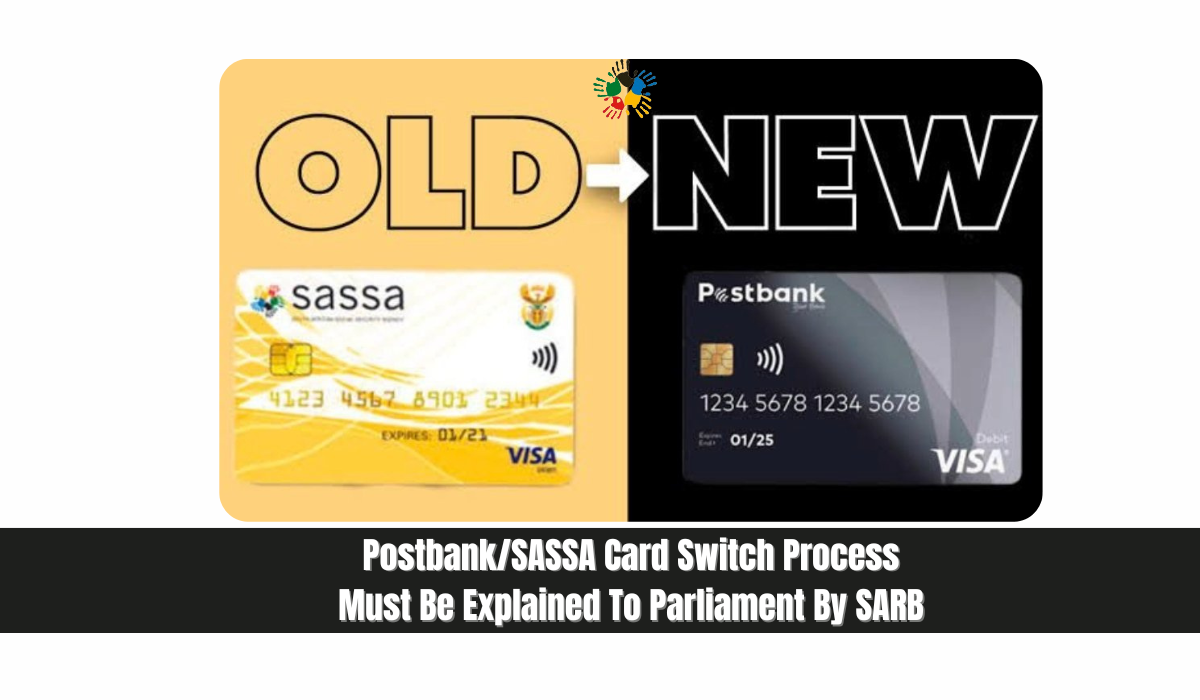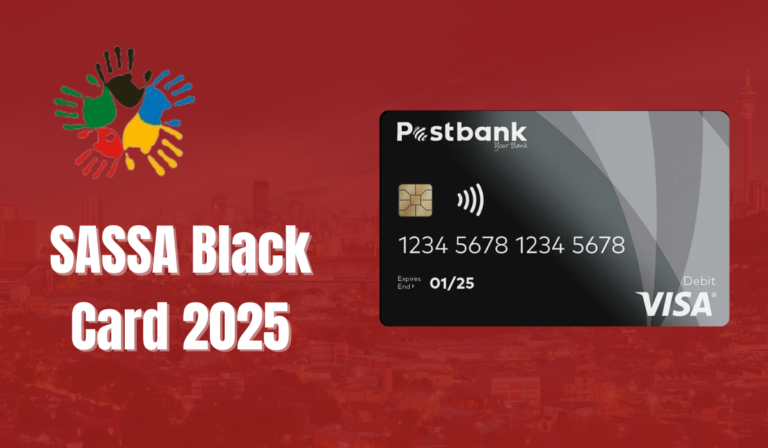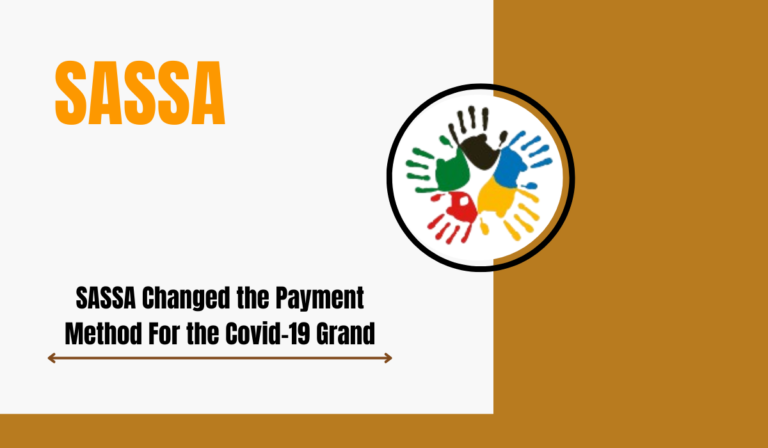Postbank/SASSA Card Switch Process Must Be Explained To Parliament By SARB

Postbank/SASSA Card Switch Process Must Be Explained To Parliament By SARB. The recent transition from SASSA gold cards to Postbank black cards has sparked national concern, confusion, and frustration among South Africa’s most vulnerable citizens. Amidst ongoing uncertainty, the South African Reserve Bank (SARB) has been called upon to provide clarity on the situation and explain the mismanagement that has left thousands of beneficiaries in limbo.
In this article, we delve into why SARB must brief Parliament, what went wrong with the card switch, the DA’s position, and what affected beneficiaries can do to protect themselves and ensure reliable access to their SASSA grant payments.
The SASSA Gold to Postbank Black Card Transition
The South African Social Security Agency (SASSA) originally issued gold cards to distribute monthly social grants to millions of citizens. These SASSA gold cards became a symbol of financial lifeline for the elderly, disabled, and unemployed.
In 2023, Postbank introduced a plan to replace these cards with Postbank black cards, claiming enhanced features and security improvements. However, the transition has been far from smooth.
Timeline of Card Switch Problems
| Date | Event |
|---|---|
| Early 2023 | Postbank announces new black card system |
| Mid 2023 | First wave of switch initiated – confusion begins |
| Late 2023 | Reports of recipients being turned away and spending money on repeated attempts |
| Early 2024 | Deadlines for card switch extended multiple times |
| March 2024 | Suspension of Postbank black cards due to technical issues |
| April 2024 | SARB instructs Postbank to keep SASSA gold cards active |
These timeline shifts and poor communication have severely impacted public trust.
Chaos and Financial Strain for SASSA Beneficiaries
The constant changes in deadlines, the technical suspension of black cards, and long queues at Postbank branches have caused unnecessary stress and financial strain for grant recipients.
Many individuals, especially in rural areas, traveled long distances and spent a portion of their limited resources trying to comply with instructions to switch cards—only to be told to return later or that systems were offline. These repeated disappointments have left beneficiaries feeling hopeless and angry.
SARB Must Explain the Postbank/SASSA Card Switch Process to Parliament
The Democratic Alliance (DA) is calling for the South African Reserve Bank (SARB) to appear before the Parliamentary Portfolio Committee on Social Development. The aim is to present SARB’s perspective and clarify why the process was so disorganized.
While SARB is not directly responsible for the Postbank’s operational challenges, the Reserve Bank’s oversight role demands accountability. A parliamentary briefing could:
- Provide clarity on SARB’s role in regulating Postbank
- Empower Parliament to hold SASSA and Postbank accountable
- Prevent future disruptions to social grant payments
DA Support for Grant Beneficiaries and Community Involvement
The DA has taken several commendable steps to support affected grant recipients during this difficult period:
- Local DA councillors opened up community halls as help centers
- They invited reputable banks to assist with opening new accounts
- Beneficiaries were educated on choosing reliable service providers
These proactive measures helped many individuals avoid further delays and ensure uninterrupted access to their monthly grants.
Why SASSA Beneficiaries Should Open Accounts with Reputable Banks
Given the instability of Postbank’s card systems, the DA is encouraging all SASSA grant recipients to consider opening accounts with reliable and trustworthy banks. Doing so not only guarantees more efficient service but also ensures:
- Fewer disruptions in receiving grant payments
- More accessible ATMs and banking infrastructure
- Improved customer service and grievance redressal mechanisms
Benefits of Switching to a Reputable Bank
| Benefit | Description |
|---|---|
| Stability | Fewer technical issues and shutdowns |
| Accessibility | More ATMs and branches in rural areas |
| Reliability | Regular monthly payments with no delays |
| Customer Support | Faster responses to queries and lost cards |
Switching to a mainstream bank could be a game-changer for SASSA beneficiaries still struggling with Postbank issues.
The Broader Implications: Trust, Stability, and Oversight
What this situation highlights is a crisis of public trust. When systems fail the poor and vulnerable, it reflects badly on both state-owned institutions and those meant to regulate them.
The repeated disruptions in the SASSA card switch are not just logistical failures—they are human failures, impacting the daily survival of millions. Parliament must now ask hard questions:
- Why did Postbank roll out a new system without adequate testing?
- What oversight did SARB provide during this transition?
- How will future upgrades or transitions be handled to avoid chaos?
SARB Expected Role and Responsibilities
The South African Reserve Bank plays a vital role in ensuring financial system stability. Even though it doesn’t operate banks directly, it has the responsibility to oversee banking institutions, including Postbank, to protect the interests of the public.
A proper SARB briefing to Parliament could include:
- An audit of the failed rollout
- An explanation of SARB’s oversight limitations
- Recommendations to strengthen Postbank operations
- A timeline for resolution and future compliance monitoring
Lessons Learned and The Way Forward
The Postbank/SASSA card switch debacle must serve as a wake-up call to all stakeholders involved in the disbursement of social grants. A multi-billion rand social security system cannot function on broken infrastructure and vague deadlines.
Key Takeaways
- Better communication strategies are essential
- Stakeholder consultation must happen before rollout
- Oversight bodies like SARB must be more proactive
- Alternative banking options should always be available for beneficiaries
Conclusion
The transition from SASSA gold cards to Postbank black cards could have been a smooth and successful operation. Instead, it became a lesson in what happens when poor planning meets vulnerable populations.





